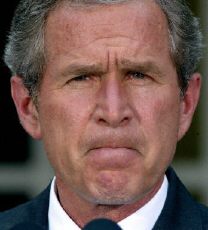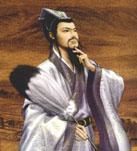 A few more days and I'll be back to regular posting, doubtless to the joy of my thousands of readers out there. Until then here's another instalment from my 'better essays' box, this one a piece on George W. Bush's job performance. It was written in early 2004, and a lot of water has flowed through the Potomac (and the Tigris) since then. But I don't think the Iraqi insurgency, immigration-gate or any of the other landmarks of Dubya's second term have hurt my thesis too much.
A few more days and I'll be back to regular posting, doubtless to the joy of my thousands of readers out there. Until then here's another instalment from my 'better essays' box, this one a piece on George W. Bush's job performance. It was written in early 2004, and a lot of water has flowed through the Potomac (and the Tigris) since then. But I don't think the Iraqi insurgency, immigration-gate or any of the other landmarks of Dubya's second term have hurt my thesis too much.________________________________________________________
John Kennedy described the presidency as ‘the vortex into which all the elements of national decision are irresistibly drawn’. The decentralized nature of American government creates a natural lethargy that can only be overcome by active presidential leadership. But the presidency is more than the country’s coordinating executive institution; it holds a symbolic, almost shamanistic significance for the American nation. As such the office places unique demands of character, intellect and emotion upon incumbents. This essay will not consider the legitimacy of George Bush’s first election. With the end of his first term in the White House approaching, the more pertinent question is whether he has demonstrated the qualities to merit a second one.
The extent to which an incumbent's personality shapes the presidential office rather than vice-versa is debatable. Nevertheless, it seems common sense that some degree of personal engagement and job satisfaction is needed for what is possibly the most demanding executive position in the world. Bush has been labeled a ‘reluctant president’, placed there by his family’s dynastic ambition rather than his own drive, and in public he often gives the impression of impersonating the role instead of engaging with it. This contrasts however with personal impressions of the man, which emphasise his focus, personal discipline and sense of his responsibilities. Since historically personality has not proved an accurate index of presidential success, we should look to more quantifiable criteria to assess Bush’s capacity for the role.
The ability to articulate a political vision for the country is arguably a president’s most powerful tool for asserting national leadership. The presidency’s central and symbolic status in the political system gives incumbents an unrivalled ‘bully pulpit’ from which to promote their message about what the government should be doing. On arriving in office George W. Bush did not apparently have a vision; his election creed of ‘compassionate conservatism’ proved a political chimera, and the new president lacked the intellectual confidence to take clear positions on particular issues. September 11 however cleared the stage for the relentless focus on one primary issue at which Bush excels. His unrefined convictions and ‘big picture’ conception of issues (“you are either with us or against us”) equipped him ideally to advance the single-minded purpose that the nation desired after the attacks.
While he alone can articulate ea political vision for
The Bush administration exhibits, by presidential standards, an impressive coherence and sense of direction. Far form being his ‘natural enemies’, Bush’s cabinet members – selected for common political views and (in several cases) long-term association with the Bush family – function both as a team and as a presidential resource, providing the wealth of knowledge and political experience that Bush himself conspicuously lacks. The White House staff is well-disciplined and organised, a tribute to Bush’s personal discipline and people skills. Such a system facilitates Bush’s ‘decide and delegate’ approach to executive leadership, with the president making big picture decisions and others seeing to their implementation.
The problem with this arrangement is that administrative support comes to substitute for active leadership. While first-hand observers agree that Bush is in charge of his administration, its intellectual and political impetus clearly comes from the eminent brains around him.
Bush himself is not well equipped to compensate for such deficits of political insight. His shortcoming appears to be neither intelligence nor self-awareness, but rather a basic intellectual laziness. He relies on his advisers to present him information in a digestible form, and then on his political instincts and core moral convictions to make decisions.* Bush supporters contend that this allows him to focus on fundamentals and overall strategy, instead of becoming encumbered in detail and producing a morass of ‘tactical’ decisions. The more probable outcome is that Bush makes decisions without adequate knowledge, either of the issues or of the political context in which his orders will be carried out. A preference for faith and instinct over facts is simply not sufficient for the numerous and complex decisions demanded of modern presidents. While incumbents should have guiding convictions, they must concern themselves enough with detail to gain some understanding of the subject matter and the difficulties of implementing the relevant policy.
While the president carries final responsibility for almost all executive functions, decentralized government disperses actual power and authority among many different entities which can potentially frustrate presidential policy at various stages of implementation. This problem is compounded by the size of the staff now needed to handle the presidential workload. Presidents thus need to take a hands-on, administrative approach to policy execution, for which George Bush’s formal training and his innate lack of initiative have not prepared him. A case in point is the administration’s failure to respond to the threat posed by al-Qaeda before September 11. Bush’s passive dependence on a national security and foreign policy team trained for the Cold War produced no action, despite clear warnings of an impending attack. The president should have taken the initiative to form his own opinion on the primary threat to American security and then to cajole his staff, the military and the intelligence agencies to respond to it.
Presidents cannot simply frame policy and expect it to be carried out; they must involve themselves in the messy reality of execution. Nor can a president’s cabinet and advisers collectively substitute for his own ‘strategic sense’ – the ability to identify what is important and devise a plan to achieve it. Bush’s flaw is not so much his lack of political experience and intellectual equipment as his proven disinclination to acquire them. He simply does not have the ‘quality of mind’ required in a president of the
* This has been described as the ‘one page memo’ approach to making policy. For example, where Bill Clinton reportedly spent twenty-five hours preparing his budget for Congress, Bush spent five.

No comments:
Post a Comment